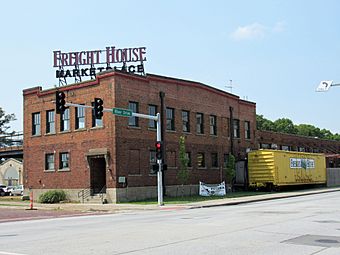Chicago, Milwaukee, St. Paul and Pacific Freight House facts for kids
Quick facts for kids |
|
|
Chicago, Milwaukee, St. Paul and Pacific Freight House
|
|
 |
|
| Location | 102 S. Ripley St. Davenport, Iowa |
|---|---|
| Area | 2 acres (0.81 ha) |
| Built | 1917 |
| MPS | Davenport MRA |
| NRHP reference No. | 85002825 |
| Added to NRHP | November 14, 1985 |
The Chicago, Milwaukee, St. Paul and Pacific Freight House is a special old building in Davenport, Iowa. Most people in Davenport call it The Freight House. It is a very important historical place. It was added to the National Register of Historic Places in 1985. This means it is recognized as a building that is important to the history of the United States.
Contents
The Freight House: A Hub for Goods
Why was the Freight House built?
The Freight House was built in 1917. It was built by a railroad company called the Chicago, Milwaukee, St. Paul and Pacific Railroad. People often called this company "The Milwaukee Road." They built it because there was a huge increase in goods being shipped by train. This was happening in Davenport right before World War I started.
The building was put in a great spot. It was right next to the Mississippi River. It was also close to other important railroad structures. For example, the Crescent Rail Bridge was built nearby in 1901. Also, Union Station, a train station for passengers, was built across the street in 1924.
Railroad shipping was very important for Davenport. It helped the city's businesses grow a lot. Because of where Davenport is located, it could get good shipping prices. This gave the city an advantage over other towns in Iowa.
What is the Freight House used for today?
The Freight House is important because it shows how Davenport grew. After being fixed up in the 1990s, the building got a new life. It has been used for many different things. It was once a comedy club, a sports bar, and even a piano bar.
Today, The Freight House is a busy place. It is home to several small businesses. These businesses often sell local products. You can find a deli, a grocery store, and even a tap room for a local brewery there.
What does the Freight House look like?
The Freight House is a long, rectangular building. It is made of strong brick. The floors and columns inside are made of concrete.
The building has two main parts. The eastern end has two stories. This part held the offices for the railroad company. The western end has only one story. This is where the large warehouse space was for storing goods.
The building was perfectly placed. It was between the train tracks (called a rail siding) and a main road. This made it easy to move goods. They could be quickly transferred from trains to trucks or wagons.



